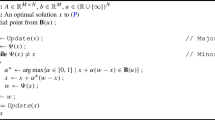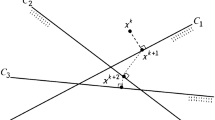Abstract
We consider the minimum-norm-point (MNP) problem of polyhedra, a well-studied problem that encompasses linear programming. Inspired by Wolfe’s classical MNP algorithm, we present a general algorithmic framework that performs first order update steps, combined with iterations that aim to ‘stabilize’ the current iterate with additional projections, i.e., finding a locally optimal solution whilst keeping the current tight inequalities. We bound the number of iterations polynomially in the dimension and in the associated circuit imbalance measure. In particular, the algorithm is strongly polynomial for network flow instances. The conic version of Wolfe’s algorithm is a special instantiation of our framework; as a consequence, we obtain convergence bounds for this algorithm. Our preliminary computational experiments show a significant improvement over standard first-order methods.
This is an extended abstract. The full version including all omitted proofs is available on arXiv:2211.02560.
SF’s research is supported by JSPS KAKENHI Grant Numbers JP19K11839 and 22K11922 and by the Research Institute for Mathematical Sciences, an International Joint Usage/Research Center located in Kyoto University. TK is supported by JSPS KAKENHI Grant Number JP19K11830. LAV’s research is supported by the European Research Council (ERC) under the European Union’s Horizon 2020 research and innovation programme (grant agreement no. 757481–ScaleOpt).
Access this chapter
Tax calculation will be finalised at checkout
Purchases are for personal use only
Similar content being viewed by others
References
Bach, F.: Learning with submodular functions: a convex optimization perspective. Found. Trends Mach. Learn. 6(2–3), 145–373 (2013)
Chakrabarty, D., Jain, P., Kothari, P.: Provable submodular minimization using Wolfe’s algorithm. In: Advances in Neural Information Processing Systems, vol. 27 (2014)
Dadush, D., Huiberts, S., Natura, B., Végh, L.A.: A scaling-invariant algorithm for linear programming whose running time depends only on the constraint matrix. In: Proceedings of the 52nd Annual ACM Symposium on Theory of Computing (STOC), pp. 761–774 (2020)
Dadush, D., Natura, B., Végh, L.A.: Revisiting Tardos’s framework for linear programming: faster exact solutions using approximate solvers. In: Proceedings of the 61st Annual IEEE Symposium on Foundations of Computer Science (FOCS), pp. 931–942 (2020)
De Loera, J.A., Haddock, J., Rademacher, L.: The minimum Euclidean-norm point in a convex polytope: Wolfe’s combinatorial algorithm is exponential. SIAM J. Comput. 49(1), 138–169 (2020)
Ekbatani, F., Natura, B., Végh, A.L.: Circuit imbalance measures and linear programming. In: Surveys in Combinatorics 2022. London Mathematical Society Lecture Note Series, pp. 64–114. Cambridge University Press, Cambridge (2022)
Ene, A., Vladu, A.: Improved convergence for \(\ell _1\) and \(\ell _\infty \) regression via iteratively reweighted least squares. In: International Conference on Machine Learning, pp. 1794–1801. PMLR (2019)
Fujishige, S.: Lexicographically optimal base of a polymatroid with respect to a weight vector. Math. Oper. Res. 5(2), 186–196 (1980)
Fujishige, S.: A capacity-rounding algorithm for the minimum-cost circulation problem: a dual framework of the Tardos algorithm 35(3), 298–308 (1986)
Fujishige, S., Hayashi, T., Yamashita, K., Zimmermann, U.: Zonotopes and the LP-Newton method. Optim. Eng. 10(2), 193–205 (2009)
Fujishige, S., Isotani, S.: A submodular function minimization algorithm based on the minimum-norm base. Pac. J. Optim. 7(1), 3–17 (2011)
Fulkerson, D.: Networks, frames, blocking systems. Math. Decis. Sci. Part I, Lect. Appl. Math. 2, 303–334 (1968)
Hoffman, A.J.: On approximate solutions of systems of linear inequalities. J. Res. Natl. Bur. Stand. 49(4), 263–265 (1952)
Lacoste-Julien, S., Jaggi, M.: On the global linear convergence of Frank-Wolfe optimization variants. In: Advances in Neural Information Processing Systems, vol. 28 (2015)
Lawson, C.L.: Contribution to the theory of linear least maximum approximation. Ph.D. thesis (1961)
Necoara, I., Nesterov, Y., Glineur, F.: Linear convergence of first order methods for non-strongly convex optimization. Math. Program. 175(1), 69–107 (2019)
Orlin, J.B.: A faster strongly polynomial minimum cost flow algorithm. Oper. Res. 41(2), 338–350 (1993)
Osborne, M.R.: Finite Algorithms in Optimization and Data Analysis. Wiley, Hoboken (1985)
Peña, J., Vera, J.C., Zuluaga, L.F.: New characterizations of Hoffman constants for systems of linear constraints. Math. Program. 1–31 (2020)
Rockafellar, R.T.: The elementary vectors of a subspace of \(R^N\). In: Combinatorial Mathematics and Its Applications: Proceedings North Carolina Conference, Chapel Hill, 1967, pp. 104–127. The University of North Carolina Press (1969)
Tardos, É.: A strongly polynomial minimum cost circulation algorithm. Combinatorica 5(3), 247–255 (1985)
Vavasis, S.A., Ye, Y.: A primal-dual interior point method whose running time depends only on the constraint matrix 74(1), 79–120 (1996)
Wilhelmsen, D.R.: A nearest point algorithm for convex polyhedral cones and applications to positive linear approximation. Math. Comput. 30(133), 48–57 (1976)
Wolfe, P.: Finding the nearest point in a polytope. Math. Program. 11(1), 128–149 (1976)
Acknowledgments
The third author would like to thank Richard Cole, Daniel Dadush, Christoph Hertrich, Bento Natura, and Yixin Tao for discussions on first order methods and circuit imbalances.
Author information
Authors and Affiliations
Corresponding author
Editor information
Editors and Affiliations
Rights and permissions
Copyright information
© 2023 The Author(s), under exclusive license to Springer Nature Switzerland AG
About this paper
Cite this paper
Fujishige, S., Kitahara, T., Végh, L.A. (2023). An Update-and-Stabilize Framework for the Minimum-Norm-Point Problem. In: Del Pia, A., Kaibel, V. (eds) Integer Programming and Combinatorial Optimization. IPCO 2023. Lecture Notes in Computer Science, vol 13904. Springer, Cham. https://doi.org/10.1007/978-3-031-32726-1_11
Download citation
DOI: https://doi.org/10.1007/978-3-031-32726-1_11
Published:
Publisher Name: Springer, Cham
Print ISBN: 978-3-031-32725-4
Online ISBN: 978-3-031-32726-1
eBook Packages: Computer ScienceComputer Science (R0)




